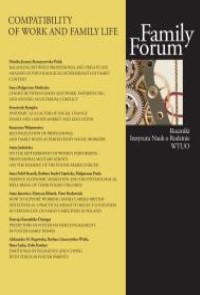Predictors of foster father’s engagement in foster family homes
Predictors of foster father’s engagement in foster family homes
Author(s): Patrycja Kaszubska-DziergasSubject(s): Family and social welfare, Welfare services
Published by: Uniwersytet Opolski
Keywords: foster father; foster fathers; foster fatherhood; family-run children’s homes; level of engagement in realization of parenting activity;
Summary/Abstract: Research background: Foster fatherhood is undoubtedly a specific kind of fatherhood, since the man, often being a husband and father to his biological offspring, makes the decision to play the role of a foster father, the performance of which requires a high level of engagement in the realization of caring-rearing as well as compensatory activities, which – in turn – call for constant raising of the competences of working with an orphaned child. Research aim: To learn about the factors which condition the level of involvement of foster fathers in the realization of parenting activity in family-run children’s homes in both the global and partial dimensions. Research method: In the study, the method of diagnostic survey and that of assessment were applied. Obtained results: The analyses proved that the level of engagement of foster fathers in the realization of parenting activity in family-run children’s homes is to a large extent conditioned by foster fathers’ personality factors; to a smaller degree it is influenced by sociodemographic factors or those which are based in the system of social welfare. Conclusions: The specific nature of tasks set for a family-run children’s home demands that foster fathers should engage in the realization of parenting activity to the highest possible degree. It is thus not only important for men to be prepared to play the role of a foster father, but it is also vital to constantly support them in this role.
Journal: Family Forum
- Issue Year: 2021
- Issue No: 11
- Page Range: 151-164
- Page Count: 14
- Language: English

